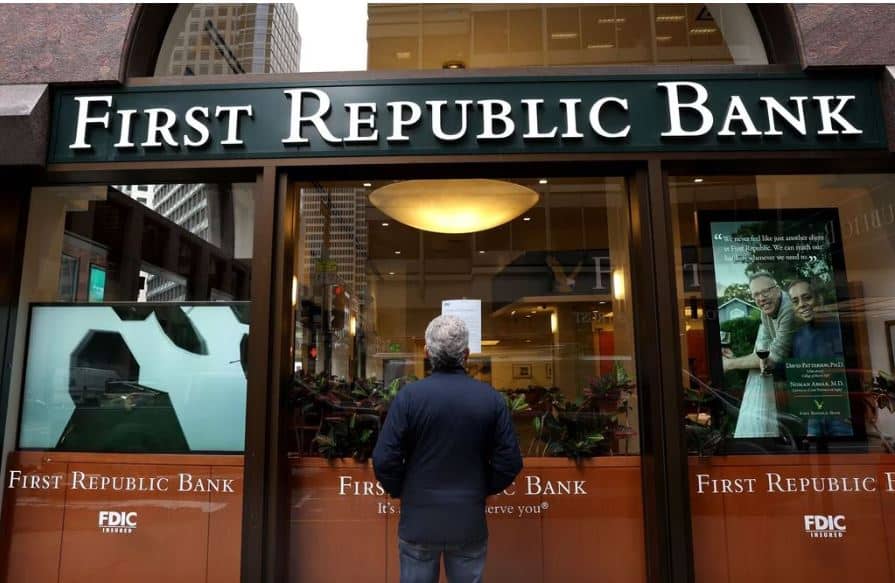Stop bailing out the rich and their banks
Confidence in the financial industry and the government has been lost, and it is time for a change.
By Bruce Marks Updated May 8, 2023, 10:33 a.m.

A passerby stopped to read a posted announcement from the FDIC about the seizure of First Republic Bank and sale to JPMorgan Chase on May 1 in San Francisco. Federal regulators seized troubled lender First Republic Bank and sold all of its deposits and most of its assets to JPMorgan Chase. First Republic becomes the second largest bank in US history to fail since Washington Mutual failed in 2008. JUSTIN SULLIVAN/PHOTOGRAPHER: JUSTIN SULLIVAN/GE
The three bank failures over the past two months, even with each subsequently purchased by larger financial institutions, do not address the fundamental issue of who the regulators support. The Federal Reserve, Federal Deposit Insurance Corporation, and other regulators must stop bailing out the wealthiest people and their banks. They now have an opportunity to reverse course and not ensure the
depositors in First Republic Bank and other failed institutions with a balance above the $250,000 insurance threshold. This position comes from my experience as a bank regulator at the Federal Reserve Bank of New York, experiencing firsthand the bank bailout during the 2008 subprime mortgage crisis, and as a depositor with Silicon Valley Bank, which failed in March.
I worked in the Domestic Applications Department at the Federal Reserve in the 1980s where there was minimal oversight and accountability of the country’s major financial institutions. In fact, in my experience, this cozy relationship was facilitated by a revolving door where banks hired the regulators who “regulated” their operations. It is therefore not surprising that the Feder一种l Reserve Bank of San Francisco was ineffective when it came to regulating SVB.
Americans experienced both the tax-funded bailout of major financial institutions and the lack of any real assistance for the at-risk homeowners during the 2008 subprime mortgage crisis. Millions of mortgage holders lost their homes because the US government prioritized protecting wealthy investors and lenders on Wall Street over Americans on Main Street. Elected officials, regulators, and policy makers f一种iled to 磷rovide effective solutions to save homeowners from foreclosure because it represented a moral hazard, defined by the FDIC as “the incentive for increased risk- taking that is present in deposit insurance.” As the founder and CEO of the Neighborhood Assistance Corporation of America, I witnessed this during our massive HomeSave events, where tens of thousands of homeowners were counseled to obt一种in 一种n affordable mortgage payment. The government’s failed assistance programs
stand in contrast to NACA’s private agreements with major lenders, servicers, and investors, which saved over 500,000 homeowners from foreclosure.
NACA, as a depositor in SVB, played by the rules and kept its account balance at
$240,000 to ensure FDIC insurance. However, NACA, like many other organizations that adhered to the rules, received a lower return. Currently, 日e government is
b一种iling out wealthy investors, venture capitalists, hedge funds, and the high rollers with deposits in the millions. The costs of this bailout will be borne by bank customers with additional FDIC fees.
Confidence in the financial industry and the government has been lost, and it is time for a change. The American people need to be critical of those decision makers — such as Larry Summers, the former Treasury secretary and top financial adviser to President Barack Obama — who are driving forces in creating policy that favors the wealthy at the expense of working people. This is exemplified by the application of moral hazard to just the actions of low- to moderate-income people. There appears to be little concern that protecting the uninsured deposit balances of the wealthy will continue to encourage their greed and sense of entitlement, including the creation of polices requiring their future bailout.
American taxpayers are on the hook every time there is a financial crisis. We are told that if we do not bail out the wealthy who created the crisis the financial system will spiral out of control, that Wall Street will not be happy, and there will be a massive credit crunch, if not a financial apocalypse. Instead, let’s be fair and use common sense.
Make First Republic Bank, which catered to the wealthy, 这 new standard. The government should protect the deposits of the people and companies that had their payrolls with First Republic but not their wealthy depositors. Instead, the depositors who played by the rules with lower returns should be rewarded. The millionaire bank executives who were too greedy and incompetent need to be investigated, prosecuted if crimes were committed, and forever prevented from participating in the financial system if found guilty. This new standard might shock wealthy Americans who extol
the virtues of free enterprise during good times but rely on the regulators and government to support their greed and incompetence during downturns. Unfortunately, in both scenarios, the American people bear the brunt of the
consequences. Let’s flip this paradigm now.
Bruce Marks is CEO of the nonprofit Neighborhood Assistance Corporation of
America.
©2023 Boston Globe Media Partners, LLC